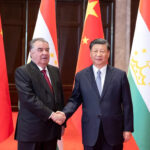Indonesia has signed a memorandum of understanding (MoU) on Halal Product Assurance cooperation with Chile in November 2020. As a follow-up, the Ministry of Religion’s Halal Product Assurance Organizing Agency (BPJPH) sent a team to conduct an assessment of the Centro de Certificacion Halal de Chile (Chile Halal).
The BPJPH Assessment Team in Chile was led by Plt. Head of Center for Halal Cooperation and Standardization M Sidik Sisdiyanto. As members, Ahmad Ngisomudin Mujahid (sharia assessor), Baiq Hana Susanti (technical assessor), and Mohammad Zen and Abdul Fikri (BPJPH Accreditation Team Secretariat).
The Foreign Halal Institute (LHLN) assessment team departed for Santiago, Chile from 28 – 30 December 2022. In Chile, they confirmed the submitted LHLN documents as well as saw the halal certification process by the Centro de Certificacion Halal de Chile (Chile Halal), one of a halal certification body recognized by the local government.
Sidik Sisdiyanto explained, the assessment was carried out referring to halal regulations in Indonesia. First, Law Number 33 of 2014 concerning Guarantees for Halal Products and Law Number 11 of 2020 concerning Job Creation. Second, Decree of the Minister of Religion (KMA) Number 748 of 2021 concerning products that must be halal certified.
Third, KMA Number 1360 of 2021 concerning Materials that are exempt from the Halal Certified Obligation. Fourth, Decree of the Head of BPJPH Number 57 of 2021 concerning Criteria for the Halal Product Assurance System (SJPH) and guidelines for LPH/LHLN accreditation.
“The assessment also refers to international standards for international guidance on criteria for institutions running product certification systems, namely ISO/IEC 17065:2012,” he explained in Santiago, Chile, Thursday (29/12/2022).
Sidik hopes that this visit can immediately focus on the implementation of reciprocal trade in halal products between the two countries. “This means we can export halal products to Chile and vice versa Chile can also export halal products to Indonesia,” he said.
According to Sidik, this collaboration is also an opportunity for MSEs that have been certified halal to market their products to Chile. Thus, UMK products can expand their marketing network abroad.
The Indonesian Embassy in Santiago welcomed and supported the visit of the BPJPH Assessment Team. Indonesian Ambassador to Chile Muhamad Anshor at the Indonesian Embassy in Santiago, explained the importance of trade relations between the two countries. Anshor, who has served as ambassador since 2019, has always supported the initiation of cooperation between the two countries.
According to him, the cooperation between Chile and Indonesia in the field of guaranteeing halal products was signed by officials of the two countries in November 2020 in Jakarta. Indonesia was represented by the Head of BPJPH at that time, Sukoso. Meanwhile, Chile was represented by the Ambassador of the Republic of Chile to Indonesia Gustavo Ayares Ossandon.
“The success of signing the MoU is inseparable from the role of the Indonesian Embassy in Santiago in building good communication with the Chilean side,” said Anshor.
Anshor hopes that this visit can accelerate the realization of the MoU that has been awaited by both parties. “Halal products from Chile include beef and beef,” said Anshor.
“If we can receive beef or beef from Chile, the Indonesian people can get more alternatives to beef in Indonesia so that beef prices can be more stable and even fall,” said Anshor. According to the information he received, the quality of cattle from Chile is better than from other countries,” he continued.
That, continued Anshor, because Chile has a very long beach, stretching from north to south for 4,270 kilometers and facing the Pacific Ocean. This geographical condition means that the natural quality of grass for cattle food is maintained, not processed food containing various additional elements. “The quality of this food affects the quality of cattle from Chile,” he explained.
“Chile is also safe geographically so that it is isolated from the spread of foot and mouth disease outbreaks in cattle,” he continued.
Indonesia as a country that requires halal certification for products that enter, distribute and trade, certainly requires meat from Chile to meet the requirements of Indonesian halal certification. Therefore, cooperation in guaranteeing halal products between the two countries can only be established if the product meets domestic requirements in both countries
Source : Kemenag.co.id
















